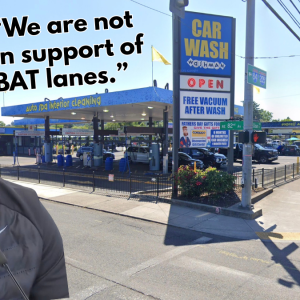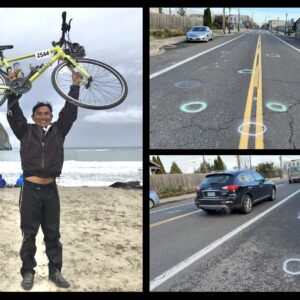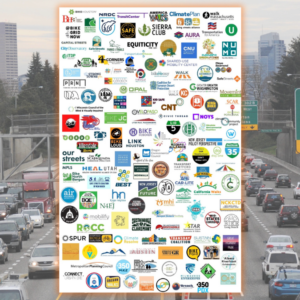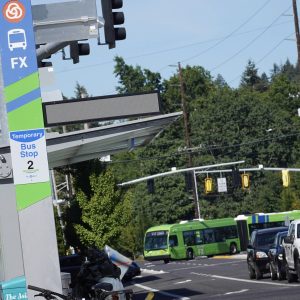
riding on Portland’s Eastbank Esplanade,
will make the case for bicycling
on Capitol Hill today.
(Photo © J. Maus)
Today, the CEO of Trek Bicycle Corporation (America’s largest bike company), John Burke, will make the case for bicycling on Capitol Hill. Burke has been invited by the House Transportation and Infrastructure Committee’s Subcommittee on Highways and Transit to be a part of a hearing titled, “Improving and Reforming the Nation’s Surface Transportation Programs.”
Yesterday at the Oregon Active Transportation Summit I sat down with Tim Blumenthal of Bikes Belong to get the scoop on what exactly Mr. Burke plans to share with the men and women who will write our nation’s transportation bill.
As you might expect, Burke will tout Trek’s economic footprint. In addition, he’ll also tell members of Congress that the U.S. bike business is worth over $6 billion a year in sales, that about 15-20 million bikes (more than cars and trucks combined) are sold in the U.S. each year and that there are more than 4,000 independent bicycle retailers nationwide (that’s a lot of small businesses).
Burke will also tell the committee that federal investment on infrastructure that makes bicycling possible has a direct impact on the business bottom line and it feeds a burgeoning activity that is spreading across the country like wildfire. Not only that, but he’ll educate committee members on the fact that investments in biking are cost-effective and have a significant return on investment.
And in case you were wondering, yes, Burke is likely to mention one of the most viral factoids the bike movement has ever produced — that since 1990 Portland has spent $57 million on its 400-mile (or so) bikeway network, which is roughly the cost of just one mile of an urban, four-lane freeway.
Burke will be just one of about 40 invited speakers at the committee hearing today, but Blumenthal says he’ll be second to last in the lineup, which hopefully means the committee members will remember what he says. Even if they don’t, his testimony will be entered into the official Congressional Record. (On that note, Burke had to sign a “Truth in Testimony Disclosure,” which should add credibility to his points.)
The CEO of Trek on Capitol Hill is a good sign that “bikenomics” is far more than just an Internet meme. Hopefully Burke’s fiscally-focused message resonates.







Thanks for reading.
BikePortland has served this community with independent community journalism since 2005. We rely on subscriptions from readers like you to survive. Your financial support is vital in keeping this valuable resource alive and well.
Please subscribe today to strengthen and expand our work.
Thanks for keeping tabs on all this good stuff, Jonathan. Glad to get the scoop. But, again, no mention of climate change. Very curious.
Hey, look how the UK Cycling Association approaches this subject: http://www.ctc.org.uk/resources/Campaigns/10_Climate-Change_brf.pdf
And Denmark, too:
“As the world struggles to find ways to fight climate change, the Danish Cycling Embassy, a coalition of NGOs, local government and charities, will be lobbying different countries to take up the bicycle as a way to improve the cityscape, boost health and most of all cut emissions.
“Cycling is a crucial test of our collective will to act to reduce greenhouse gases and to demonstrate that reduction equals a better quality of life and a healthier population,” says Professor John Whitelegg, a Professor of Sustainable Transport and Development at the University of York.
“Switching from cars to bikes brings an immediate climate change gain and signals that lifestyles and thinking have finally got the climate change message. There are no technical, financial or logistic issues in this transport transformation; the only thing missing is the will to act and the time to act is now.” ”
http://tinyurl.com/yew2gq7
more from the same article:
“But the age of the automobile is coming to an end and it looks like the Danes have got it right.
The DCF says the world can look “backwards” to countries like America that have dumped the bicycle and are struggling with rising obesity and CO2 levels as a consequence or “forwards” to countries like Denmark where the bike is taking over.”
Will he tell them that his carbon bikes aspolde when introduced to sunlight?
A co-worker, inspired by my example, tried biking to work a few times. Part of his motivation was the diagnosis of hypertension. I helped design a route that would limit high traffic stretches and narrow roads; but there was no alternative than to use some of them.
After being buzzed and honked and bullied in all of 6 commute tries, he threw in the towel. He now rejoins the rest of the lemmings, following tailpipes in his Jeep.
I think there are lots of people who would really like to bike but are terrified by the car-centric state of affairs. If you build it, they will come. A few inches of a four lane freeway cost could turn his commute into a much better experience.
We need to talk about reducing the legal and civil rights of motor vehicle operators. Police should be ordered to act in a much heavier-handed way enforcing the law on drivers than on cyclists or pedestrians. Your automobile ought to be a place where the Constitution and Bill of Rights don’t apply.
Hey, I’d settle for constitutional rights applying outside of people’s cars, i.e., to non-motorized road users. I agree, enforcement of motorized violations is not nearly consistent nor painful enough to discourage dangerous driving, let alone unnecessary driving. I don’t think you would want to frame it in terms of limiting constitutional rights, but emphasize that driving is a privilege, and not a right. It should be a privilege that people have to work to keep, and can more easily lose.
meh, we will see what the actions are, remember, for politicians, the votes are “counted”
regarding not mentioning of climate change: this is a very tactical move by the advocacy groups because it is such a knee-jerk subject, particularly for some of the Republicans who will be running the hearing. With the current balance of power in DC, our message needs to focus on lowering transportation costs, lowering health care costs, making our streets safer, that liveable communities spur business growth, that young workers want to live where biking and walking are possible, etc. For now, it’s more tactical to keep climate change in our hearts and minds, but not in the discussions with some of the people in power who vehemently believe climate change is a hoax.
John Burke is an inspiring and interesting speaker, so he will definitely do us proud in DC.
Absolutely spot on! I wrote something similar to this last night but it must have offended the moderators somehow.
Denmark and Copenhagen in particular, has been recognised a lot for bikepaths and high share, but if you want inspiration, you may look to the Netherlands who in general must be recognised as bike country number 1, but also many larger Swedish (check Malmö) and German cities, like Berlin, does an often even better job.
I am from Copenhagen, Denmark, and often a little embarrased of the sometimes undeserved respect we get.
What we do well I think is the tri-bikes, which are really suitable for carrying several children doing all the groceries etc. Check brands like Nihola, Trio-bike, and Christiania.